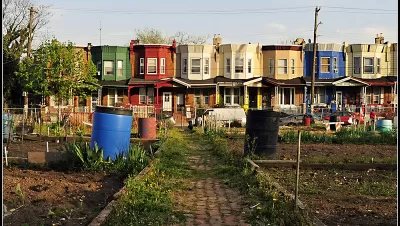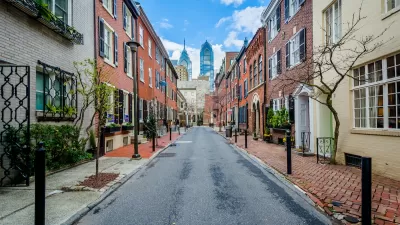Jonathan Geeting argues that Philadelphia’s recently proposed affordable housing program is focusing on the wrong problem—in Philadelphia, housing is quite affordable, but people are still too poor to afford it.

“While it’s always good to see well-meaning city leaders engaging with housing affordability and cost of living issues, the big problem with Clarke’s plan is that the housing affordability ‘crisis’ he’s worrying about doesn’t actually exist,” writes Jonathan Geeting in a recent article that gives a detailed examination of a recently announced affordable housing proposal by Philadelphia City Council President Darrell Clarke.
“The housing itself is quite cheap here compared to most of Philadelphia’s peer cities. The real issue is the 28.4 percent poverty rate, one of the highest in the nation. Cheap as the housing is in absolute terms, a sizable segment of the population still doesn’t earn enough money to afford it.”
According to Geeting, the distinction “matters a great deal, because mistaking the poverty problem for a housing market problem biases the political response toward some needlessly expensive and low-impact policies.”
The article provides detailed analysis of the cost of housing in several Philadelphia neighborhoods—including some of those mentioned in Clarke’s reports—all of which are affordable enough that, according to Geeting, they could make “heads explode” in New York City and Washington D.C. Geeting also recommends that Philadelphia begin to measure housing affordability after factoring in the cost of transportation.
FULL STORY: Philly Has an Income Problem, Not a Housing Affordability Problem

Planetizen Federal Action Tracker
A weekly monitor of how Trump’s orders and actions are impacting planners and planning in America.

Maui's Vacation Rental Debate Turns Ugly
Verbal attacks, misinformation campaigns and fistfights plague a high-stakes debate to convert thousands of vacation rentals into long-term housing.

San Francisco Suspends Traffic Calming Amidst Record Deaths
Citing “a challenging fiscal landscape,” the city will cease the program on the heels of 42 traffic deaths, including 24 pedestrians.

Defunct Pittsburgh Power Plant to Become Residential Tower
A decommissioned steam heat plant will be redeveloped into almost 100 affordable housing units.

Trump Prompts Restructuring of Transportation Research Board in “Unprecedented Overreach”
The TRB has eliminated more than half of its committees including those focused on climate, equity, and cities.

Amtrak Rolls Out New Orleans to Alabama “Mardi Gras” Train
The new service will operate morning and evening departures between Mobile and New Orleans.
Urban Design for Planners 1: Software Tools
This six-course series explores essential urban design concepts using open source software and equips planners with the tools they need to participate fully in the urban design process.
Planning for Universal Design
Learn the tools for implementing Universal Design in planning regulations.
Heyer Gruel & Associates PA
JM Goldson LLC
Custer County Colorado
City of Camden Redevelopment Agency
City of Astoria
Transportation Research & Education Center (TREC) at Portland State University
Jefferson Parish Government
Camden Redevelopment Agency
City of Claremont




























